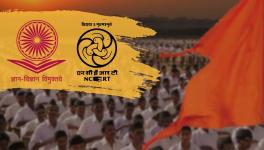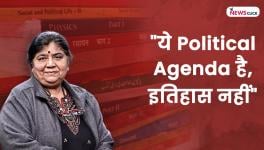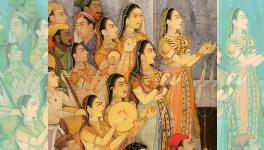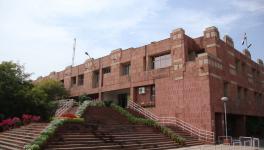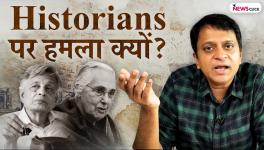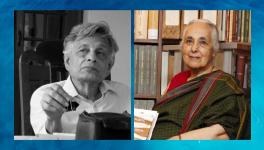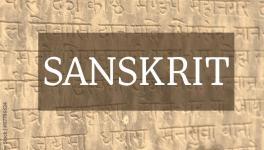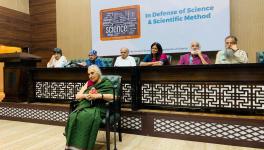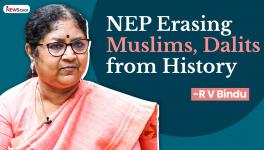The Future in the Past: The Use and Misuse of History
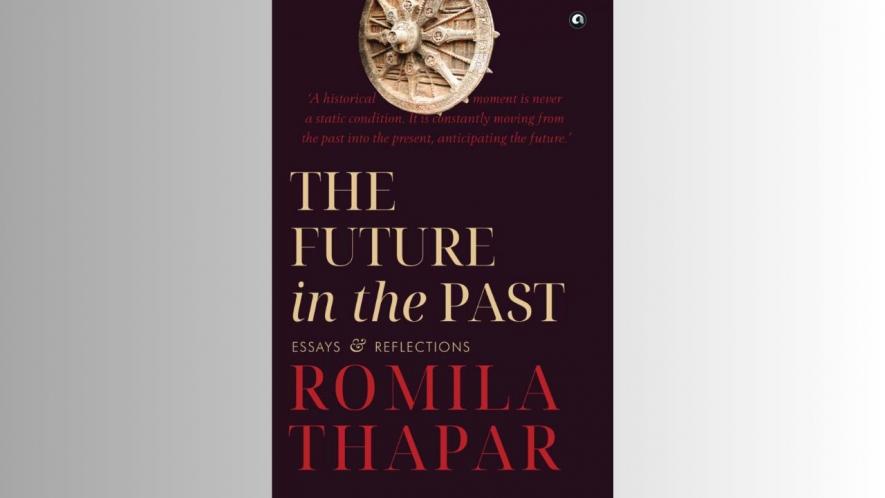
Image courtesy Aleph Book Company, 2023
In The Future in the Past (Aleph Book Company, 2023), Romila Thapar brings together issues and ideas that she has engaged with throughout her career. Some of these are the use and misuse of history, the myths surrounding the coming of the Aryans, religious fundamentalism in the study of society, the overt and insidious attempts by right-wing elements to pervert Indian culture, variants of the Ramayana, the importance of museums, why dissent is important to democracy, the role of the public intellectual, and more.
The following is an excerpt from the book.
To comprehend the present and move towards the future requires an understanding of the past: an understanding that is sensitive, analytical, and open to critical enquiry. This was the turn taken by professional Indian historians writing in the decades since Independence and is now regarded as legitimate historical writing. Their studies were not only fine examples of historical enquiry but were also pointers to new ways of extending historical methods. They widened and sharpened the intellectual foundations of the discipline of history and enriched the understanding of the Indian nation. These studies either, directly or indirectly, have been attacked by the agencies of certain governments, thereby making a mockery of history. It is because of this assault on history that some of us have to speak in defence of the discipline of history.
Indian history as written by professional historians in the 1960s and 1970s moved from being largely a body of information on dynasties and a recital of their ‘glorious deeds’ to a broad-based study of social, economic, and political forms. In this there was a focus on religious movements, on patterns of the economy, and on cultural articulations. The multiple cultures of India were explored in terms of how they contributed to the making of Indian civilization. Therefore, many aspects of this multiplicity and its varying cultures—from that of forest dwellers, jhum cultivators, pastoralists, peasants, artisans, to that of merchants, aristocracies and specialists of ritual and belief—all found a place in the mosaic that was gradually being constructed. Identities were not singular but plural and the most meaningful studies were of situations where identities overlapped.
In recent years, Indian history has moved towards what some have described as almost a historical renaissance. The writing of Indian historians, ranging over many opinions and interpretations, were read and studied in the world of historical scholarship, not only in India but wherever there was an interest in comparative history. Historical interpretations at this time and in many parts of the world used methods of historical analyses that were derived from a range of theories that attempted to explain and interpret the past.
These included Marxism of various kinds, schools of interdisciplinary research such as the French Annales school, varieties of structuralism, and others. Lively debates on the Marxist interpretation of history, for example, led to the rejection of the Asiatic Mode of Production as proposed by Marx, and instead focused on testing whether other modes of production of Marxist history applied. There was no uniform reading among Marxists, leading to many stimulating debates on social and economic history. The ideas of historians other than Marxists, such as Marc Bloch, Fernand Braudel, and Henri Pirenne were included in these discussions. The intention was not to apply theories without questioning them, but to use comparative history to ask searching questions. If those who are currently busy attacking every serious historical interpretation took the trouble to read historiography—the history of historical writing—they might begin to understand what history is all about.
Some of the more obvious examples of these debates relate to varying themes of historical interest. The changing history of caste in Indian society was being studied in detail to ascertain social change and explain social disparities. It was also being viewed in a comparative sense with other systems of social organization, such as the patterns of social hierarchy viewed as that of masters and slaves as in the Greco-Roman world, or of feudal lords and serfs of the medieval world or of the more easily recognizable class-oriented societies of recent centuries. Historians were asking the same questions that the Buddha had asked when told about Greek society: why do some societies have caste and others have a two-fold division of master and slave? These were questions that were not concerned primarily with making value judgements about caste but with trying to comprehend it as a system of organizing society.
The debate on whether or not there was feudalism in India has caught the attention not only of Indian historians but also of many medieval historians in other countries. The categories of feudalism are no longer restricted to a single definition of a feudal mode of production, for many permutations and combinations are recognized and these give new forms to the concept of feudalism.
The historical investigation of the range of ideas that went into shaping Indian nationalism became a testing ground for assessing forms of nationalism in societies other than the Indian. The ideology of nationalism was enquired into and the enquiries ranged from its role in intellectual history to its impact on lesser-known local and popular movements.
New themes came under the purview of historical investigation. Gender history focused on women, not merely as additional players but as primary players and their role in the genesis of some social forms began to be studied. Systems of knowledge came to be examined in terms of their influence on society and their
function rather than restricting their history to merely repeating the obvious—that these were great advances in knowledge. The formation and definition of a range of Indian cultures came to include the formulations of culture from communities other than elite groups and this widened the base of social history. It also influenced the extensive study of new religious movements, their beliefs and rituals, and their audiences. An interest in the history of the environment suggested fresh hypotheses about the rise and decline of urban centres or the impact of hydraulic changes or deforestation on settlements of various kinds.
This intellectual efflorescence was suddenly sought to be terminated by the authorities in power. A blight began about ten years ago, culminating in the present enforced clampdown on the process of exploring ideas. This has reached the point where the attempt is to denigrate the independent intellectual and to undermine a historical understanding of our society and its past. It has taken a variety of forms. Sometimes it has taken the form of political actions, later it resorted to intervening in and closing institutions connected to academic research, and most recently it has taken to censoring books and textbooks, to reducing the curriculum to a ridiculous minimum of objective type questions, of deleting large portions of history of the medieval period, and giving historical study a questionable twist to favour only the garbled history of the majority community. Each action is orchestrated to a single aim.
This is an excerpt from Romila Thapar's The Future in the Past: Essays and Reflections, published by Aleph Book Company, Republished here with permission from the publisher.
Romila Thapar is Professor Emerita of History at the Jawaharlal Nehru University, New Delhi. She was elected General President of the Indian History Congress in 1983 and a Fellow of the British Academy in 1999.
Get the latest reports & analysis with people's perspective on Protests, movements & deep analytical videos, discussions of the current affairs in your Telegram app. Subscribe to NewsClick's Telegram channel & get Real-Time updates on stories, as they get published on our website.









